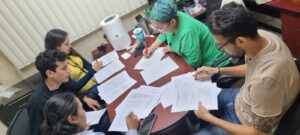
Empowering Early-Career Researchers to Combat Non-Communicable Diseases in Nepal: The AuthorAID Connection
Non-communicable diseases (NCDs) have firmly entrenched themselves in Nepal’s public health landscape, contributing to an alarming 66% of national deaths, claiming over 127,000 lives. The achievement of global NCD targets by 2025 and the Sustainable Development Goals by 2030 hinges on effectively addressing this escalating NCD burden. As the prevalence of NCDs continues to surge, the urgency of prioritising prevention and control measures becomes paramount to safeguard the population’s health and well-being.
Addressing this challenge requires a comprehensive approach, with a pivotal role played by local early-career researchers in accelerating progress and discovering innovative solutions. Among these researchers, Dr. Buna Bhandari, Assistant Professor of Epidemiology at the Central Department of Public Health, Tribhuvan University Institute of Medicine, Kathmandu, Nepal, stands as a prominent figure. She is also a Lown Scholar at the Department of Global Health and population, Harvard Chan School of Public Health, USA. Alongside her research and teaching in Nepal, Dr Bhandari is an AuthorAID Steward, actively participating in facilitating online courses and webinars, helping us to support researchers globally.
With a substantial research portfolio in various public health domains, Dr. Bhandari has significantly contributed to addressing pressing health issues in Nepal. Her research spans critical areas such as non-communicable disease prevention, maternal health, and evidence generation through quality systematic review and meta-analysis. Recent work includes a study on Barriers and facilitators for treatment and control of high blood pressure among hypertensive patients in Kathmandu, Nepal and a study on addressing domestic violence during pregnancy using safety measures. In the realm of digital health, Dr. Bhandari explores the effectiveness of mobile phone text messaging interventions in controlling blood pressure among hypertension patients in Nepal, with a recent study examining the effectiveness of text messages delivered by mobile phone in helping patients manage blood pressure and generated high quality evidences on ‘Long term food intake and cardiovascular mortality’ through systematic review and meta-analysis.
For Dr. Bhandari, research serves as a window to resolve societal health issues, fostering connections with diverse communities while generating evidence for well-being. However, being an early-career researcher in South East Asia comes with numerous challenges — inadequate resources, publication obstacles, and societal biases. The scarcity of funding, outdated facilities, and lack of cutting-edge equipment hinder research quality, while the absence of robust mentorship makes it difficult to develop new skills. Networking opportunities are scarce, isolating researchers from valuable collaborations, and the struggle to publish in prestigious journals undermines visibility and recognition.
Dr Bhandari first encountered AuthorAID’s online courses on scientific writing in 2015 and immediately recognised the potential of the platform. These courses provided invaluable knowledge and skill development, particularly for early-career researchers like herself. More than just skill-building, AuthorAID offered a nurturing environment for networking and collaboration, along with access to crucial resources and publication support. After taking the AuthorAID online course in 2015, she successfully published her research paper. In 2017, she secured a competitive scholarship for her PhD study in Australia.
Not only did AuthorAID offer Dr Bhandari support to develop skills and resources needed to overcome research challenges, but it also facilitated connections with mentors, collaborators, and peers from around the world. This network has enabled her to work on collaborative projects, most recently resulting in the successful submission of a competitive NIH grant application with researchers based in the United States and Zimbabwe.
“AuthorAID is more than a mere platform. It’s a hub of researchers, offering resources for capacity development, mentorship, and networking opportunities. Through these invaluable resources and the guidance provided by its mentorship program, Author AID equips you with the skills and knowledge needed to transcend the barriers you face on your career journey.” -Dr. Bhandari
Dr. Bhandari’s commitment to tackling challenges faced by early-career researchers extends beyond her personal achievements. Her proactive approach led her to secure seed grant funds, enabling the initiation of a pioneering women’s mentorship program in Nepal. Her story underscores how AuthorAID plays a transformative role by bridging critical gaps for researchers in developing countries. Through its comprehensive offerings, the platform assists in overcoming writing obstacles, navigating the intricate terrain of grant applications, and identifying relevant journals for publication.
In regions with limited resources and networking opportunities, AuthorAID proves invaluable for enhancing researchers’ skills and advancing their careers. Our aim is to nurture a inclusive scientific community, assisting members to mitigate some of the inequities that make it so difficult to navigate their early careers, and in doing so ensure that more researchers in more places are able to apply their talents and expertise to meet pressing social, environmental and health challenges. Through our online courses, mentorship, networking, and carefully curated library of tools and guides, we’re amplifying the scientific voices of the Global South who are driving positive change.


 Previous Post
Previous Post Next Post
Next Post


